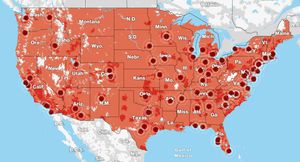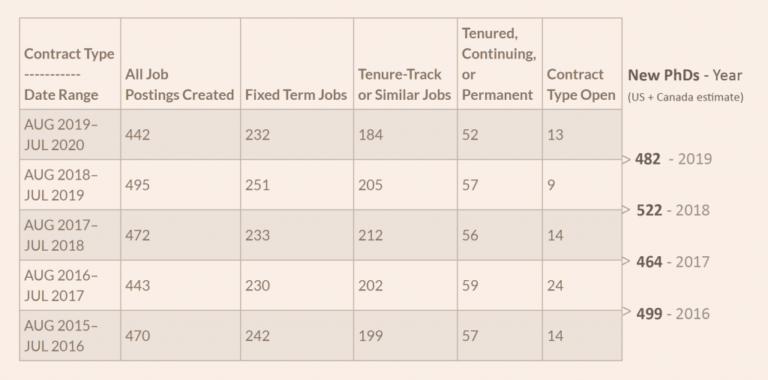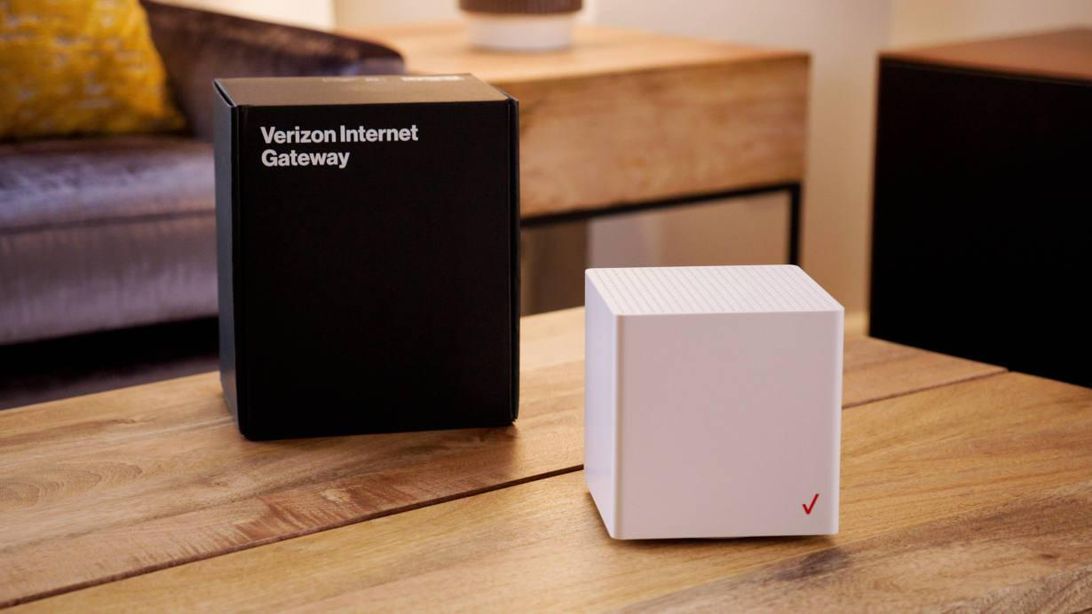
Even if Verizon 5G Home Internet is available in your city, there’s no guarantee it’s available at your address. That’s because serviceability requires relative proximity to one of Verizon’s 5G cell towers and a strong, steady signal.
In this article
Additionally, there are no service contracts or early termination fees and no data caps to contend with. That means you can use your connection as much as you like without fear of incurring overage charges for using too much data. On top of that, Verizon 5G Home Internet doesn’t come with a promo rate, so your bill won’t arbitrarily jump up after the first year.
Verizon 5G Home Internet is available in many places, but most of them are centered around America’s largest metro regions, where the development of 5G infrastructure is the furthest along. That puts it on a similar trajectory as fiber, with service primarily focused in America’s largest cities, where the population density makes expansion more cost-effective.
Verizon 5G coverage map
Verizon
Verizon 5G Home Internet availability
Verizon’s terms are about as straightforward as you’ll find in the home internet market. The monthly rate includes all taxes and fees, and you won’t need to pay an additional equipment fee as you will with most providers, either. In December 2021, Verizon announced a new Wi-Fi 6E router that’s currently available to new Verizon 5G Home Internet customers.
I mentioned T-Mobile and Starry — those are the two other providers currently offering 5G home internet plans. AT&T is the notable absence here. The company has its own 5G network and it currently offers fixed wireless home internet service too, but that service doesn’t make use of 5G, at least not yet.
Check your address to verify Verizon 5G Home Internet serviceability
All of that assumes you’re paying the full per month, but if you opt for the 5G Home, your monthly bill falls to . In that case, Verizon’s value figures come out to 10 cents per Mbps for average speeds at 500Mbps, 17 cents at 300Mbps and 50 cents at 100Mbps.
Unlike fiber, cable, DSL and other common modes of internet that get you online with a wired connection, cellular internet plans like Verizon 5G Home Internet take a fixed wireless approach. As the name suggests, that means your home will get its internet connection wirelessly by way of a receiver that picks up Verizon’s signal and broadcasts it throughout your home as a Wi-Fi network.
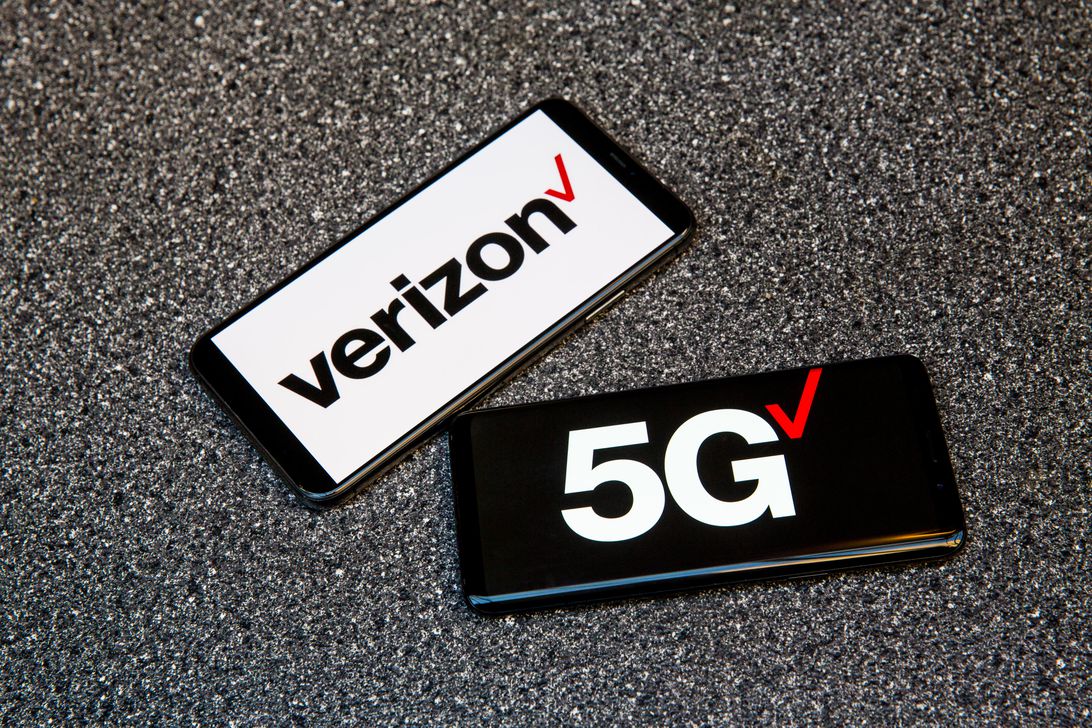
Verizon 5G Home Internet speeds, prices and terms
Verizon 5G Home Internet plans
| Plan | Max speeds | Monthly price | Equipment fee | Data cap | Contract | Price guarantee |
|---|---|---|---|---|---|---|
| Verizon 5G Home | 300-980Mbps download, 50Mbps upload | $50 | None | None | None | 2 years |
| Verizon 5G Home Plus | 300-980Mbps download, 50Mbps upload | $70 | None | None | None | 3 years |
Take me, for instance. I live near downtown Louisville, Kentucky, where Verizon’s 5G Home Internet is an option for some — but Verizon can’t offer service at my address yet, even though I have a cell plan with Verizon and service that’s strong enough for my phone to connect over 5G on a semi-regular basis when I’m at home. That lack of availability might change in the near future (and I’m definitely eager to test the service out and tell you all about it), but for now, all I can do is wait.
That said, deploying new cell towers and upgrading existing ones is generally faster than wiring entire regions for fiber, neighborhood by neighborhood. So, while availability is still somewhat limited, there’s room for hope that 5G might be able to bring speedier home internet to underserved parts of the country faster than fiber, cable or other, more common modes of internet.
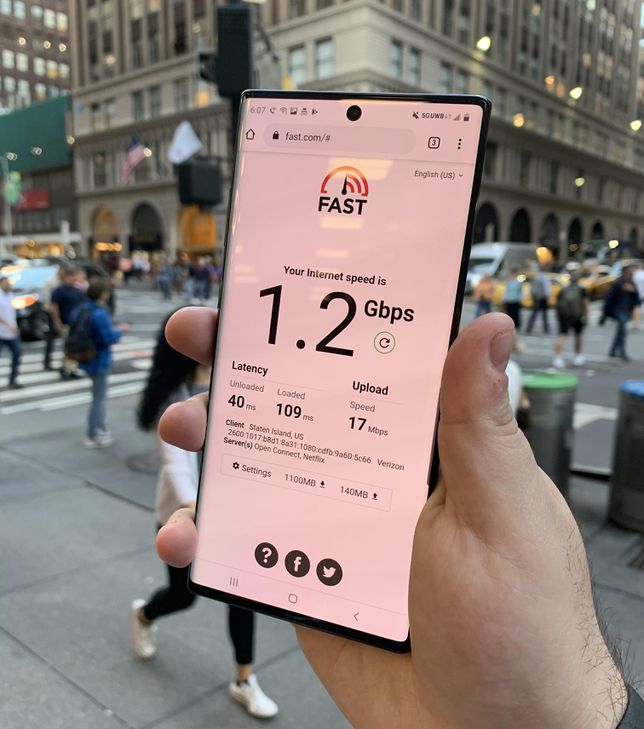
Eli Blumenthal/CNET
How does Verizon 5G compare to Verizon 4G LTE speeds?
All of that is pretty appealing, and it matches what we see from T-Mobile and Starry, the other two names of note offering 5G home internet plans. Like Verizon, neither of them enforces contracts, data caps or equipment fees. That seems like a smart strategy for providers hoping to tempt customers into trying something new.
That expansion of 5G infrastructure will be the key to bringing availability to more people and strengthening the signal for Verizon’s existing customers. If Verizon can continue growing its service map at a fast clip, and its simple, straightforward approach to pricing proves popular, Verizon’s 5G Home Internet service might be a potential game-changer. We’ll continue to watch this space, and I’ll update this post as soon as we’ve had the chance to test the service out for ourselves.
Verizon 5G Home Internet has no data caps, contracts or hidden fees
If your current provider charges an early termination fee for ditching it before your contract is up, Verizon will cover that cost when you switch (up to 0). On top of that, new Verizon 5G Home Internet Plus customers will get free Disney Plus for a year (and 5G Home customers get it for free for six months). Both plans get one month of service for free. Finally, Verizon is offering new customers two free months of Sling TV, a CNET Editors’ Choice-winner among streaming TV services.
Verizon’s 5G Home Internet service first launched in 2018, and availability has surged over the past year. Just this January, Verizon unveiled its 5G Ultra Wideband network, which made its 5G Home Internet available in approximately 900 cities.
That stacks up pretty well with the top cable providers, most of whom charge at least 25 cents per Mbps, on average. Fiber still tends to offer the best value, though, with most plans typically coming in between 9 and 17 cents per Mbps. If you’re choosing between fiber and 5G, I’d still lean towards fiber in most cases.
Verizon 5G Home Internet vs. the competition
Remember how I mentioned 5G home internet providers are trying to lure customers away from other ISPs? That’s the case with Verizon, as the company is currently offering a lot of sweeteners for anyone thinking about making the switch.
As for each company’s coverage map, T-Mobile offers the most comprehensive availability, with cellular internet service currently available to over 30 million households across the US. Verizon told us in February that it now offers 5G home internet service to 30 million households as well and targets 50 million by 2025. Starry is the smallest provider of the three and is currently available in six cities. Still, the company plans to expand access to 30 million homes in new markets by the end of 2022.
Want to see if Verizon 5G Home Internet is available at your address? Here’s the link.
On paper, there’s not much to criticize here. Verizon 5G Home Internet offers some genuinely outstanding terms, and the download speeds could potentially match what you’d expect to see from cable or fiber. And don’t forget that Verizon is consistently ranked as a top ISP for customer satisfaction by organizations like the American Customer Satisfaction Index and J.D. Power. I wish the uploads were faster than 50Mbps, especially given that Starry promises uploads as high as 200Mbps — but that might also be an indicator that there’s room for Verizon to improve over time and as its 5G network expands.
Verizon’s 5G network is capable of hitting gigabit speeds in select areas.
Speeds will vary based on the connection quality at your address, but Verizon says most customers should expect average download speeds of about 300 megabits per second. In select parts of the coverage map, speeds can get as high as 940Mbps. As for your uploads, which affect video calls and posting large files to the web, most homes should expect to see speeds of around 50Mbps.
